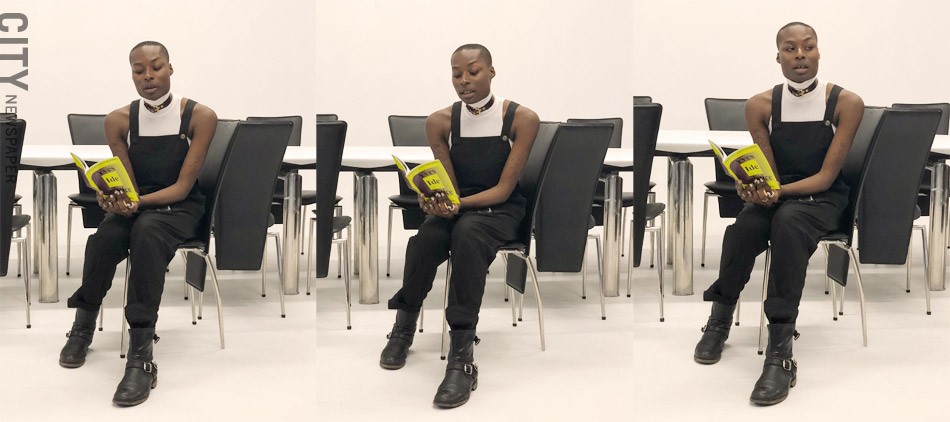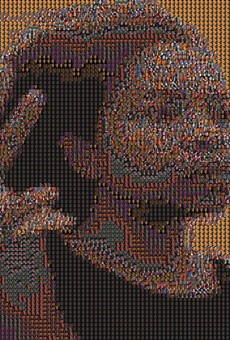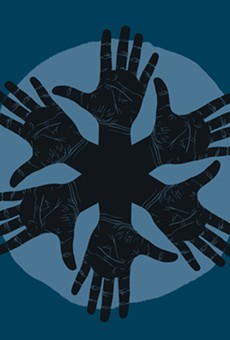
- PHOTOS BY REBECCA RAFFERTY
- Jahmal B. Golden reads from their book of poetry, "Yves, Ide, Solstice."
This event was a homecoming for Golden — originally from Rochester, they were recently based in New York City. Their work has been exhibited at Czech Center and AC Institute in NYC, Mother Culture Gallery in LA, and Art Space in Mexico. Golden is currently an artist in residence at the RAW center for Art, Knowledge, and Society in Dakar, Senegal, and they have been accepted to the MFA program at Bard College.
While visitors to Gallery Seventy Four mingled and checked out Golden’s digitally-altered photographs of hands, an audio installation component floated from speakers in the darkened installation room — distorted sounds and defiant laughter and Golden’s voice reciting the words to their poem, “Memoir,” which was also displayed on the gallery wall.
Golden read selected poetry from their 2017 book “Yves, Ide, Solstice” as well as new work from their upcoming collections. The poems are meandering explorations of what can be known of the self and the other, and the self with the other, and sharing space in bliss and through strife.
“I wrote this book in dedication to the idea of what love is, and it operates in three sections,” Golden said. “Solstice is about, as solstices are, the longest and richest portion of what love really is. The second is Ide, and that’s when it becomes more like a warning, more of like wondering if this actually is what it seems. And questioning that, but also still participating with it. Yves is just kind of about my alter-ego reacting to losing at love, me interpreting what it felt like to get my feelings hurt.”
The unpublished poems that were read are from an upcoming collection about Rochester, many of which are dedicated to Golden's mother, Rochester-based artist, writer, and performer Reenah Oshun Golden.
Jahmal B. Golden co-curated the event with series organizer Rachel DeGuzman, and recommended the two screenings that followed their poetry reading. The first up was “Young & Gay: Jamaica’s Gully Queens,” a 30-minute piece by VICE News that spotlights the brutal reality of a group of LGBTQ youth living in a storm drain in New Kingston, Jamaica. Often kicked out of their homes, the youths are subject to violence in broad daylight and have few allies in a government that, by insisting it is not responsible for them, is complicit in the dangers and death that they face. The story reveals how the youths have eked a sense of home, community, and safety — relative to what they face above ground — from squalid conditions, and briefly explores some local activist allyship. But overall the piece is bleak as hell.
Immediately following the VICE documentary, DeGuzman screened MTV Decoded’s short video spot “Can You Choose Your Own Pronouns?” which offers some acerbic levity as it schools viewers on the fluidity of language, grammar, and gender.
The Long Table Conversation included members of the LGBTQ community with a specific focus on gender nonconforming and trans voices. The participants discussed the anemic sanctuary for trans people in Rochester and beyond, especially in the intersection of queerness, race, and class, and cited examples of recent nationwide precedents that have created serious setbacks to advances that have been made.
“We’re not safe,” said author, podcaster, and teacher Javi Mason, who then referenced the Trump administration’s ban of the word "transgender" from the CDC’s 2018 budget documents. “We are literally being erased, especially if we are people of color,” Mason said. “What can we do to prepare for the worst?”
It was reported this week that 28-year-old Amia Tyrae Berryman was the seventh trans woman of color known to be murdered this year. She was found shot to death in Baton Rouge on March 26, and despite the nation-wide flurry of discussions about gun violence, her murder has received meager coverage.
About a year ago some local activists founded Trigger Warning, a queer and trans gun club that is focused on self-defense and building resilience. The club is political in nature and was a response to Trump’s election, the failure of police to protect queer and trans people and people of color, and the ubiquity of police violence.
Safety and camaraderie isn’t usually found in public spaces, but at one another’s houses, said activist Adrian Elim. “I think a lot of us are very tired of public displays of these kinds of conversations, it’s always triggering, and we’re still just at level one, having the same conversation.”
Within a sub-discussion about allyship and unity regarding racism, sexism, and homophobia, Elim lamented the fact that those impacted the most by these issues — who are already struggling just to navigate the day with concerns like passability and how that paradigm impacts access to housing and jobs as well as issues of safety — are burdened with the extra labor of educating everyone else about why they should care.
“I struggle with this a lot,” Elim said. “I’m gonna be honest, I’m not feeling this ‘we are the world’ kind of thing. Because as much as I would love for us all to come together and sit in a room and meditate and do amazing things, I know that specific kinds of people are expected to do the hard work. It’s usually on the feminine spectrum, it’s usually on the trans spectrum, they’re black and brown people. We’re expected to give out these olive branches and we don’t even have a tree. The folks with the forest don’t want to extend an olive branch.”
Following up on that, Golden agreed that “there should be more unrest coming from people who have been allotted more space, more privilege, and are actually allowed a spot in public discourse.”
Members of the long table also critiqued the cis gay community’s inadequate allyship for trans people (citing but not limiting the discussion to RuPaul-and-fans’ erasure of trans femmes from a highly visible TV program) and touched on marriage equality as "assimilationist" and not the end-all of the fight for equality. The group also knocked the VICE doc’s lack of acknowledgement that Jamaica’s homophobia is rooted in its colonization, and for the exploitative tragedy tourism it provides to viewers around the world.
“You know how many homeless queer people I see on a daily basis?” Elim asked. “But it’s just like, we have to project our consciousness all the way to Jamaica to kind of feel what that is.”
Golden discussed Christianity’s impact on people’s intolerance toward one another. “Decolonize your mind,” they said. “That’s not advice, that's totally a demand at this point. Far too many people have died so that Christianity can be something you wear around your neck.”
Related ‘And, Ain’t I a Woman’ conversation focuses on intersectionality

‘And, Ain’t I a Woman’ conversation focuses on intersectionality
Art
Activist, musician, and Trigger Warning co-founder Zora Gussow joined the group at the table to add that visibility in cultural programming is still intrinsically tied to profitability, and that people who don’t fit into established categorization or aren’t seen as profitable or productive — people with disabilities, or undocumented workers who don’t speak English — are forsaken by capitalism. Gussow added that genuine allyship is not just about accepting people’s existence, but being willing to step up and support the livelihood and actual thriving of marginalized people. “I’m glad you admit that I actually exist, but you don’t admit that my existence is harder than yours,” they said.
Much of the discussion centered on how the lack of intersectionality in the LGBTQ community leads to weakened unity between marginalized groups. Gussow referenced last summer’s arguments that arose after some members of the local queer community protested the Rochester Pride Parade due to its use of an RPD escort — which each year comes with a price tag of $10,000 billed to the Out Alliance.
“It’s a giant joke,” Gussow said, “because there’s huge parts of the LGBTQ community who are consistently persecuted by the police for being LGBTQ, for being black, for being a person of color, for being undocumented. People were like, ‘Why are you protesting your own fucking parade? Why are you fighting the people in your own club?’ But it’s like, is it our club? You want them to listen, but if people are insistent on not listening, maybe you take the next step in forcing them to listen.”
“Fuck up the fun,” Golden added.
“Women of Wakanda: A Long Table Conversation” has been postponed, with a new date TBD. The next event in the At the Crossroads series is "Mass MisEducation: A Long Table Conversation and Installation" and takes place on April 14, 3 to 6 p.m., at Gallery Seventy Four, 215 Tremont Street.

